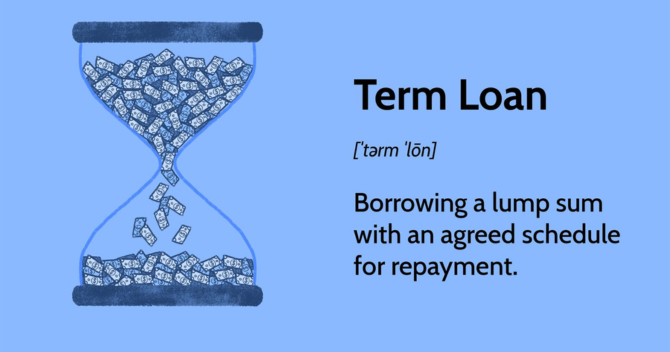The interest rate linked with a Term Loan must be taken into account while making a decision. The cost of borrowing is determined by the term loan’s interest rate, which also has a big impact on how much you’ll have to pay back overall during the loan’s period. In this post, we will look at how to compute the interest rate on a term loan, the variables that affect it, and helpful advice for lowering interest rates. We have affordable Personal Loan options at Credit Success that are suited to your financial requirements.
How to Calculate Term Loan Interest Rate
Calculating the Term Loan interest rate involves a simple formula. The formula for calculating the interest amount is
Interest Amount = Loan Amount × Interest Rate × Loan Tenure
For example, let’s consider a Term Loan of Rs. 1,00,000 with an interest rate of 10% per annum and a loan tenure of 3 years. The interest amount can be calculated as follows
Interest Amount = 1,00,000 × 0.10 × 3 = Rs. 30,000
To calculate the Term Loan interest rate, you can use the following formula
Interest Rate = (Interest Amount / (Loan Amount × Loan Tenure)) × 100
Using the example above, the interest rate can be calculated as
Interest Rate = (30,000 / (1,00,000 × 3)) × 100 = 10%
Interest Rate Table
| Loan Amount (in Rs.) | Loan Tenure | Interest Rate |
| 1,00,000 | 1 year | 10% |
| 5,00,000 | 2 years | 12% |
| 10,00,000 | 3 years | 14% |
Factors Affecting the Term Loan Interest Rate
Creditworthiness
Your credit score and credit history play a crucial role in determining the interest rate. A higher credit score usually leads to lower interest rates, reflecting a lower risk profile to lenders.
Loan Tenure
The loan tenure affects the interest rate. Generally, longer-Term Loans may have slightly higher interest rates compared to shorter-Term Loans due to the increased risk associated with a longer repayment period.
Economic Factors
The prevailing economic conditions, inflation rates, and the Reserve Bank of India’s monetary policy can influence interest rates. During periods of high inflation, interest rates tend to be higher.
Tips to Reduce Interest Rates on Term Loans
Maintain a Good Credit Score
Pay your bills and EMIs on time, minimize credit utilization, and avoid defaults to maintain a good credit score. A higher credit score can help negotiate lower interest rates.
Compare Lenders
Shop around and compare loan offers from different lenders. Different lenders may offer varying interest rates and loan terms. Select the suitable option as per your financial situation.
Opt for Shorter Loan Tenures
If feasible, consider opting for a shorter loan tenure. Shorter loan tenures typically come with lower interest rates, and you can save on interest payments in the long run.
Offer Collateral
Providing collateral or a guarantor for your loan can help reduce the interest rate. Lenders often consider secured loans as less risky and may offer more favorable interest rates.
Conclusion
Understanding the Term Loan interest rate and how it is calculated is crucial for managing your finances and making informed borrowing decisions. By calculating the interest rate using the provided formula, considering the factors that affect interest rates, and implementing tips to reduce interest rates, you can optimize your borrowing experience. At Credit Success, we offer personalized Personal Loan options with competitive interest rates, enabling you to achieve your financial goals.
FAQs
What is Term Loan EMI?
Term Loan EMI (Equated Monthly Installment) is the fixed amount paid by a borrower to a lender at regular intervals, typically on a monthly basis, to repay a Term Loan. It consists of both the principal amount and the interest charged on the loan, spread over the loan’s repayment tenure.
What are the 3 types of Term Loans?
The three types of Term Loans are
Short-Term Loans: These loans have a repayment period of less than one year and are usually used to fulfill immediate funding needs.
Medium-Term Loans: These loans have a repayment period ranging from one to five years. They are often used for business expansion, purchasing equipment, or undertaking projects.
Long-Term Loans: These loans have a repayment period exceeding five years and are commonly used for large-scale investments such as buying property, funding infrastructure projects, or starting a new business.
Is Term Loan Good or Bad?
The suitability of a Term Loan depends on various factors and individual circumstances. Term Loans can be a beneficial financial tool when used wisely and for the right purposes. They provide a lump sum amount upfront, allowing borrowers to meet their financial needs and goals. Additionally, Term Loans often offer lower interest rates compared to other forms of credit, such as credit cards. However, it’s crucial to carefully consider the terms and conditions, interest rates, repayment ability, and the purpose of the loan before deciding if a Term Loan is good or bad for your specific situation. Proper financial planning, understanding the terms, and making timely repayments can help borrowers maximize the benefits of a Term Loan.

